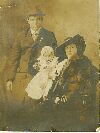

When very young I heard my relatives mention that the Mofford name traced its roots back to Scotland.
"C.L. Mofford told me (his son, Larry) what he learned of the family background from his parents...(our) ancestors came from Scottish and English stock to Barbados. At the end of their tenure as indentured servants (about ten years) many moved to other Islands in the West Indies."
"Most were illiterate and couldn't read or write, consequently the current name of MOFFORD is an adaption of what the common name of the 'clan' was called. Ford is a popular suffix of English names - no doubt readily adopted in Barbados probably from the Scottish suname of MOFFIT."
The story goes that a Mofford (possibly spelled differently - Moffat, Moffit, Morford, Mawford...) fought on the side of the Clans in Scotland against the English.
But which battle? Could it have been the battle of Worcester in 1651, in which seven to eight thousand Scots were defeated by the English. Many of the survivors who escaped the hangman's noose were sold to British plantation owners in the Caribbean. Or could it have happened many years later at the bloody battle of Culloden April 16, 1746, where 5,000 Scots (Jacobites) were defeated by 9,000 English(Hanoverian)forces?
My uncle Wallace Mofford (who passed away while visiting in Trinidad on Nov. 28, 1998), second son of C.L.Mofford and Mary O'beline Sampson, in a letter to his brother Larry dated November 8, 1978 states, "The Mofford surname was also written 'Moffatt' on early land titles, Moffatt/Moffat being Scotish in origin, in St.Vincent. The family carrying this name was believed to be exiled from Scotland in 1665 when Cornwall(sic)(Cromwell) defeated the Scottish Clans. Eight hundred Scottish prisoners and peasants were sent to the colony of Barbados alone to work as indentured slaves on the sugar plantations. Others were scattered throughout the English Caribbean: St.Vincent, St.Lucia, Grenada and Jamacia...(they)lived under very poor conditions, some turned to piracy, such as the 'Greave' surname."
The Anglo-Scottish wars saw many of the Clans captured and hanged by the English while the survivors were saved from the hangman's noose only to be shipped to "the Barbadoes". If one was 'barbadosed' he/she was doomed to serve as an indentured slave to work on one of the various sugar plantations.

Another story I heard has my ancestor as a coachman from either Scotland or Northern England. He had committed an offence, possibly highway robbery, and was sentenced to work in the plantations in the Caribbean.
This latter story has some merit as a letter from Clara Mofford, written to her son Cuthbert on April 12, 1957 states,
"...Mofford was a short generation but you are all
bringing a larger one. There was a man, a coachman,
he came to Barbados and a woman had a child for him,
a boy. He became a man and married. They had four sons
and one girl. One son, (most likely named Frank) married Sarah Gibson who became your grandmother...they were born in Barbados."
Sybil Mofford told the story that the Moffords were kicked out of England for rum running. (Now I know why I like rum so much.)

The facts take over from the myths at this point. There was a man named Thomas Mofford in Barbados, as early as 1715 and possibly as early as 1651.
Cuthbert Lawrence (Bert) Mofford (my grandfather, also my father's name) was born at Kingstown, St.Vincent in April 1894. His father, Robert Adlophus (my great-grandfather) was a farmer from Barbados. Frank Mofford was the father of Adolphus and he was born in Barbados.
Frank Mofford may have been one of a group of people known as the "redlegs". The redlegs were, "decendants of condemned men, Scotts-Irish slaves and British prisoners of war exiled for life and sold for 1,500 lbs of sugar each." (Above quote written by Lindsay Haines, a.k.a. Juliet Mofford and titled, White Outcasts of the Caribbean.)
Thomas J. Keagy has written his Master's thesis on the Redlegs of Barbados and in an article (Americas, 1975, Vol.27 pp.14-21) taken from his thesis he sheds light on the origins and lives of the "redlegs" (Quote-"The term 'Redleg', unflattering as it may be, is traced to the era when the indentured white toiled in the sugar cane fields wearing a kilt and became sunburned on the legs."p.14 Americas, Vol.27).
It is interesting to note that the redlegs, who eventually became known as the 'poor whites' never, or very rarely intermaried with the negro population that was growing on the Island although, as Mr. Keagy notes, "there is a high degree of racial harmony and no ostensible social discrimination." (ibid, p.18).

Therefore Thomas and Francis were landowners making the theory of Moffords as 'poor whites' less likely. The research continues.
More information is recorded here on page 4. Mofford Caribbean history.
FastCounter by LinkExchange
 Scottish Battles.
Scottish Battles.
